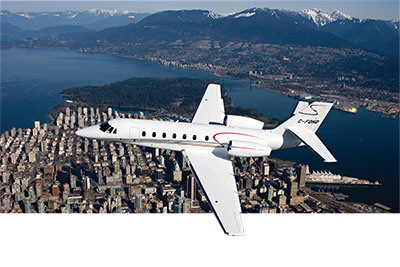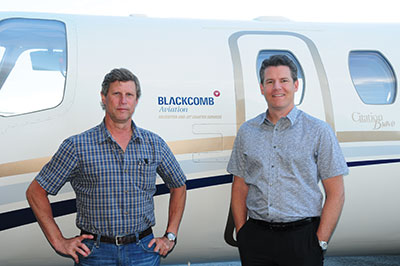
Features
Operations
Nurturiing a Key Brand
As confidence returns to the economy, British Columbia’s Blackcomb Aviation is poised to grow ahead of the curve.
November 14, 2013 By Paul Dixon
As confidence returns to the economy, British Columbia’s Blackcomb Aviation is poised to grow ahead of the curve. The company has a sound understanding of its markets and exceeding its customer expectations through adherence to a corporate culture based on an unswerving dedication to safety and customer service.
 |
|
| Blackcomb Aviation boasts a growing fixed-wing fleet aimed at providing clients with the utmost in style and comfort. PHOTO: Blackcomb Aviation |
Blackcomb Aviation is a partnership between John Morris and the McLean Group, a Vancouver-based family business with interests in commercial real estate, construction, communications and a significant position in Vancouver’s Hollywood North with Vancouver Film Studios. This unique blend of aviation experience and business acumen gives Blackcomb the solid foundation required for future growth.
Morris started flying with Okanagan Helicopters in the mid-1970s and, in his own words worked, “all over the place” doing a little bit of everything. In the late 1980s, Fletcher Challenge (then a major player in B.C.’s forestry sector) needed someone with a multi-engine, rotary-wing background to run its in-house aviation program. It was a dream job for Morris. “I flew a Jet Ranger, the 222, the Beaver, the Falcon 20 – it was fantastic,” he says.
But when the bottom fell out of the global market for pulp and paper in the mid-1990s, Fletcher Challenge was forced to shed what it could to stay afloat. Morris’ last job with Fletcher Challenge was to sell off the corporate aircraft, find jobs for as many of the displaced staff as possible and find a local aviation company that could provide assets on an as-needed basis. It was, he said, a great opportunity.
“I went home and thought about it for half an hour, talked to my wife about remortgaging the house again and the rest is history,” he says. “With two helicopters and five people, we launched Omega Aviation . . . it just sort of grew from there.” Opportunity for growth soon appeared in the guise of a friend who approached Morris with a question about buying an airplane. The fellow thought he needed one, but didn’t want to fly it himself or deal with the maintenance and paperwork. Could John take care of that for him?
“I said, absolutely, so we got a fixed-wing AOC and got him a King Air 200. Then, we added a TBM 700, which became a Citation Bravo. Then, we added another Citation Bravo and a King Air 350 along with a Sovereign. They’re managed aircraft, all owned by outside entities.”
Adding an important component
Sacha McLean learned to fly when he was still a student at Queen’s University. Harbouring aspirations of a career in aviation, he was all-in and had both his fixed-wing multi-engine and helicopter licence in short order, but graduation saw him return home to Vancouver to join the family business. One arm of that business owned a large parcel of land in east Vancouver which housed an assortment of warehouses popular with film makers for temporary use as makeshift sound stages. It would be the 21-year-old Sacha who had the idea of dedicating the site to the film industry as the principal tenants, instead of looking at them as short-term tenants until someone better came along. The result was Vancouver Film Studios, the largest purpose-built facility in Vancouver and home to a long list of award-winning feature films and TV series.
McLean kept his pilot skills current by commuting from his home on Bowen Island to the studios heli-pad in his Bell 47. Knowing his affinity for helicopters, film clients at the studio pitched McLean on the idea of acquiring a twin-engine helicopter with a gyro-stabilized camera mount. Enter John Morris. A common friend introduced Morris and McLean, thinking they might have something in common and he was right. The McLeans invested in a Twin Star for use by their film clients at Vancouver Film Studios, leased it to Omega to operate it and as they say in the movies, it was the start of a beautiful relationship.
This encounter took place 1999; fast forward to 2005. The McLeans are chartering an Omega jet to attend a conference in Las Vegas. Morris is the captain and he has something to share with them. Steve Flynn, the founder of Blackcomb Helicopters, has just approached Morris about buying his company. Morris, realizing that this would more than double the size of Omega has doubts. “I wasn’t sure I wanted to jump in without the requisite background, so I approached the McLean family with the idea that if they wanted to get a little further into the aviation business, this was the opportunity.”
The McLeans were indeed very aware of Blackcomb Helicopters, McLean notes, and “we liked what Steve Flynn had done. We liked the brand, we liked the positioning and we liked the diversity of the customer base, so we jumped at the chance.” Shortly after that, Goldwing Helicopters of Sechelt, B.C., was acquired, and by 2008, the three entities were operating as Blackcomb Aviation, a very deliberate decision to capitalize on the strong name recognition. Today, Blackcomb has 20 helicopters and eight fixed-wing aircraft in its fleet.
New leader, new vision
Jump ahead to February 2013 when Jonathan Burke was brought in as president and chief operating officer (COO). A self-described aviation nerd, Burke flew helicopters in B.C.’s forestry sector for 11 years before family commitments caused him to rethink his direction in life. In 1998, he went to work in the venture capital sector and earned an MBA.
 |
|
| John Morris (left) and Jonathan Burke are working hard to create an organization that capitalizes on its opportunities. PHOTO: Paul Dixon
|
For Morris, Burke is an ideal fit for the company. “He is a professional manager, he knows how to manage a company, knows how to allocate resources, knows how to set goals and how to get them done and how to measure what we’ve done,” Morris says. “I’m not that guy, I’m an ops guy. He’s an ops guy, but now he can speak to both sides.”
McLean remembers the moment he knew Burke was the right man for the job. Morris and the four McLeans made up the search committee. “He’s done things already that I’m the first to admit that I couldn’t have done. I’m an entrepreneur, not an operator. He’s an operator, he’s a through and through operator,” Mclean says. “He has the respect of our people – he’s developed a strategic plan. You can feel the excitement around the bases.
Burke describes Blackcomb Aviation as “a phenomenal company with a phenomenal group of people” that provides a sound foundation for growth. “We’ve got the managed aircraft business here in Vancouver, the fixed-base rotary operations up and down the Sea-to-Sky corridor and then we’re moving into the rotary-wing utility construction and maintenance where we are going out and repairing or building new power lines. So, we’re preparing these three areas for growth, which is more than just saying, ‘OK, we’re going to grow.’ It means putting the systems and processes in place, with the right people in the right positions to handle growth.”
From Burke’s perspective, the pitfall for many small- or medium-sized companies is they are not able to transition their business practices involving accounting or human resources to handle the transactional volume of an enlarged business.
From the very beginning, Morris built his company on three words – safety, respect and value (SRV or the mnemonic Stevie Ray Vaughn.) “We’ve got these three words. Safety is a cultural thing. It’s ongoing and the buy-in process never stops. The respect proposition is very simple: respect for the people, respect for the equipment, respect for the employees, respect for the customers, respect for your peers and respect for your subordinates. The third word is value and one of the things I always talk about with our customers in terms of the value proposition is that it comes with maturity and a high level of respect we have for our safety systems and our training which is what our customers are paying for. That’s the world we operate in.”
Hiring the right people is key for Morris; it’s the foundation of creating the right corporate culture at Blackcomb. “You can have the best pilot on the planet,” he says, “but if he doesn’t get along with his co-workers and he doesn’t get along with the customer and it’s a constant battle, then he doesn’t fit into the respect component here very well.”
Graeme Milne, Blackcomb’s operations manager, fixed wing, at YVR, describes being the right person as going well beyond being a good pilot. There is a requirement for social skills that is not taught in aviation schools. “When you become a member of our corporate culture, there’s a lot of trust placed on you and you have to integrate appropriately with the owners of the aircraft and their groups so that everybody feels comfortable,” he says.
Blackcomb’s operation at YVR supports four managed helicopters and all of its fixed-wing aircraft. There is no typical client, though generally speaking, the aircraft are owned by individuals or corporations located in Vancouver or southwestern British Columbia. The helicopter owners have a need for travel in the region, whereas the fixed-wing aircraft serve the local region, and as larger aircraft join the fleet, will expand out across the continent and beyond in the future.
Morris understands that the reasons for people choosing to purchase an executive aircraft go far beyond being able to afford it. “Airline travel can be incredibly inconvenient. It doesn’t save time or money,” he says. “With a corporate aircraft, you can go where you want when you want to go, and there has never been a better time to acquire an aircraft than right now.”
For Morris, it’s about building the right relationship with the customer from the very beginning – a bond that makes them feel comfortable and valued. “We like to sit with the customer and figure out what they need,” he says. “We learn what their expectations are and then we will go out with them and acquire the highest value aircraft for their needs. Then, we can provide a turnkey process which makes it as simple as them picking up the phone and saying we need to go somewhere.
The importance of the customer relationship is an absolute for Burke. “It’s a relentless focus on our professional attitude, our focus on the customer from every employee in the company,” he says. “We’re always thinking from the customer’s perspective – what is it they are doing, what is it they want? So, we always think about the little things, in addition to the big picture things like how the company is doing financially and we are continuing to hire the right people.”
Looking to the future, McLean says he is optimistic about Blackcomb’s future growth prospects.
“It’s an overused statement, but we’ve really worked hard to build a great foundation, so I think we truly are poised for growth,” he says. “I don’t think we have any crazy ideas about making this thing enormous. We just want to grow it organically over time and I think it will always have that nice small feel to it.”